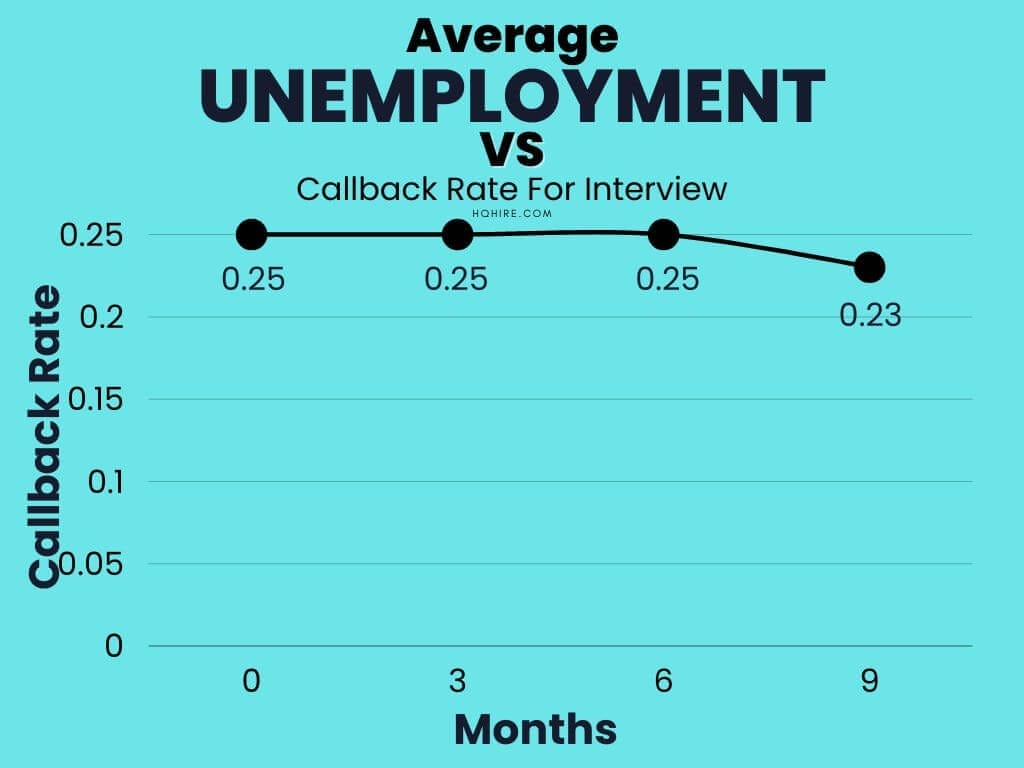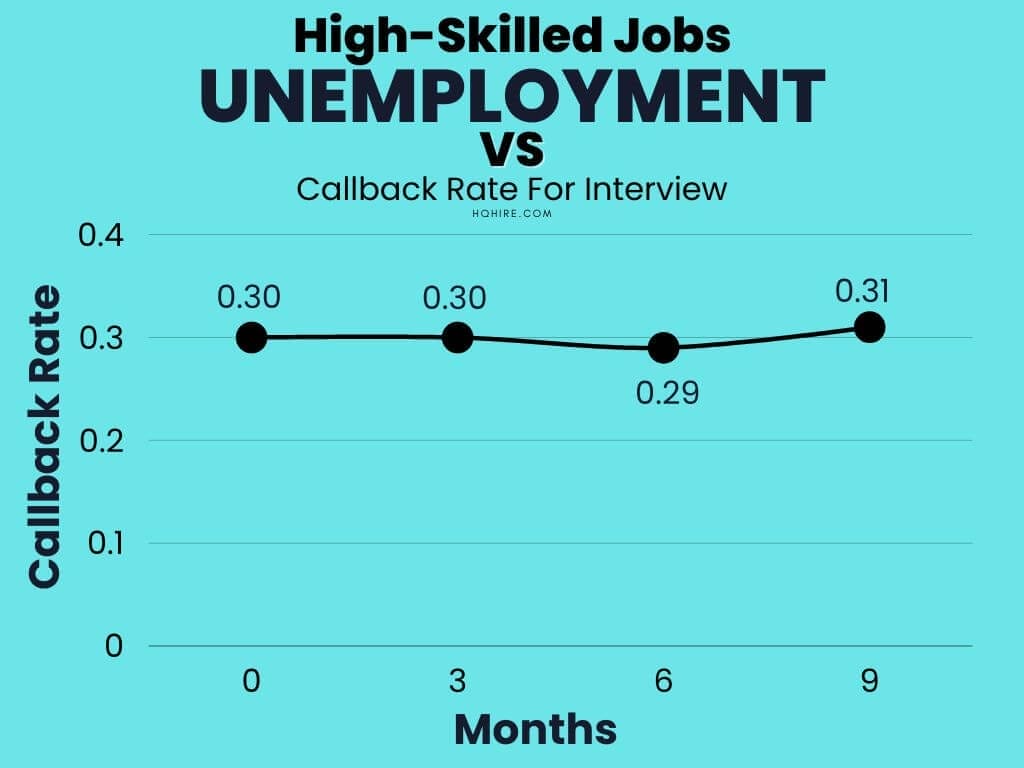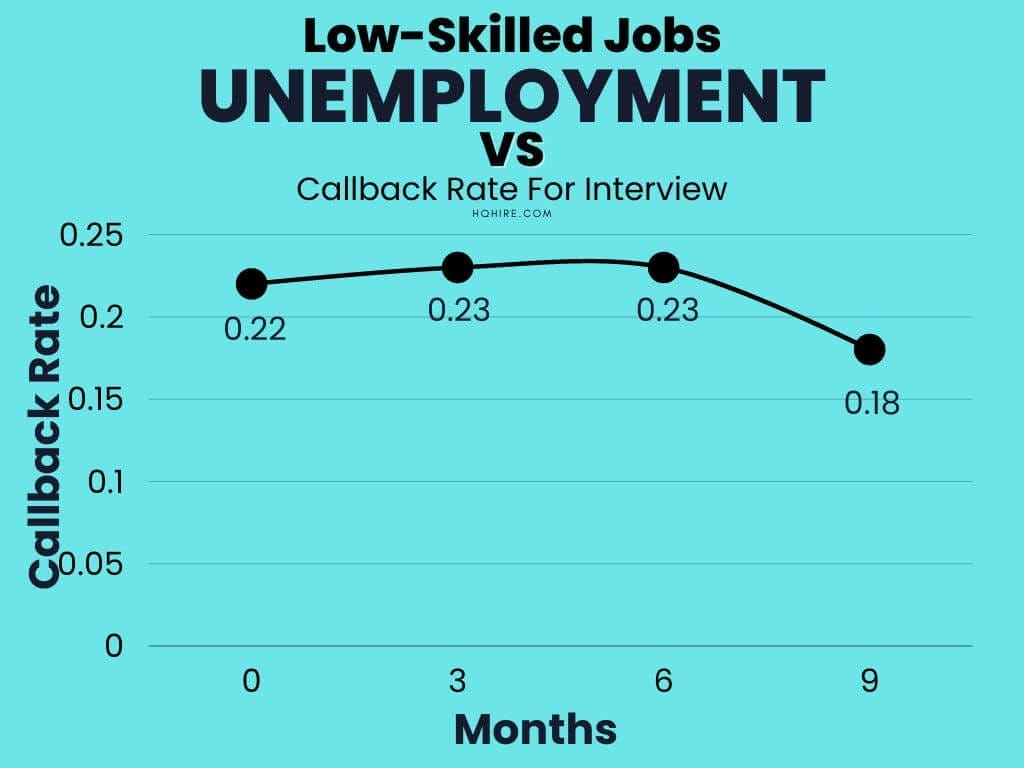Employers often view candidates with employment gaps as less desirable than those with uninterrupted work histories.
It is a common understanding that the impact of an employment gap on finding a job varies greatly according to the length of the gap.
But how long of an employment gap is actually too long and can affect your chances of getting employed?
How Long Is Too Long Of An Employment Gap?
A field study was published by American Economic Association where over 8,000 resumes were sent to 3,000 different job positions by an imaginary job candidate who was either doing a job switch while being employed or has been unemployed for Less than 3 months, less than 6 months, and less than 9 months, or more than a year.

Using the “callback rate” where the candidate is invited for the job interview as a guide, the results were surprising. The study gives an insight into how recruiters and employers think when they are assessing potential candidates.
There is a surprising difference between candidates who are looking for high-skill jobs which require a University education versus candidates who are looking for low-skilled jobs which typically require secondary education.
Actively Employed When Finding Job: The Baseline
Setting the baseline, we understand what is the call-back rate for candidates who are actively employed while finding a job.
These are candidates who send their resumes while holding a job.
- High-skilled jobs: The callback rate is 30 out of 100 resumes sent.
- Low-skilled jobs: The callback rate is 22 out of 100 resumes sent.
For candidates who are looking for a job while currently actively employed, there is a 1 in 3 chance to 1 in 5 chance that you will be called for the interview.
Unemployed for 3 Months: No impact on interviews
Being unemployed for 3 months can seem like an eternity for many job seekers. But for recruiters and employers, being unemployed for 3 months will not have any negative impact on you during your job search.
- High-skilled jobs: The callback rate is 30 out of 100 resumes sent.
- Low-skilled jobs: The callback rate is 23 out of 100 resumes sent.
There is little to no significant difference for candidates who looking for a job after they are unemployed for less than 3 months, in fact, for low-skilled jobs, there is a higher callback rate compared to finding a job while actively employed.
This shows that a candidate will not face any disadvantages with that short unemployment status.
What is the Reason?
The reason is probably that most employers understand that finding a job takes a fair amount of time, and 3 months is an acceptable time frame.
- High-skilled jobs show no impact. With a limited amount of jobs available, time is required to find the perfect fit.
- Low-skilled jobs show a slight 4.3% positive impact. Many employers view the short unemployment status as a bonus since these candidates will be readily available for work.
Unemployed for 6 Months: Gradual drop-off in Interviews
Being unemployed for 6 months shows not have much impact on the job search as well. Hatting the six-month timeframe probably stretches the envelope as far as how long it can reasonably take for a candidate to find a job.
- High-skilled jobs: The callback rate is 29 out of 100 resumes sent.
- Low-skilled jobs: The callback rate is 23 out of 100 resumes sent.
Similar to being unemployed for less than 3 months, candidates who are unemployed for less than 6 months see little impact on finding a job due to their unemployment status.
But it seems to show signs of a slight diminishing odd for high-skill jobs compared to the baseline.
What is the Reason?
With the impact of the recession and pandemic, probably most employers feel that 6 months is still considered an acceptable timeframe to find a job.
- High-skilled jobs show a slight 3.3% negative impact. With a period of 6 months, sufficient time is given for the candidate to find a job, depending on the industry some jobs are more specialized which helps to increase the callback rate.
- Low-skilled jobs show a slight 4.3% positive impact. Employers view the option of the candidates to be readily available for work to be a plus, as most low-skilled jobs are often urgent and require manpower immediately.
Unemployed for 9 Months: Significant drop-off in Interviews
Unemployment for 9 months shows a significant difference in the drop-off for interview requests for high-skilled jobs and low-skilled jobs.
- High-skilled jobs: The callback rate is 31 out of 100 resumes sent.
- Low-skilled jobs: The callback rate is 18 out of 100 resumes sent.
High-skilled jobs show little impact due to prolong unemployment, while low-skilled jobs show a significant 18% decrease fall in interview requests from potential employers.
What is the Reason?
Probably most employers feel that 9 months of job search is sufficient for most candidates to find a job. Even with a recession, the inability to find a job for 9 months will probably be a red flag that leads to a drop in the interview request.
- High-skilled jobs show a slight 3.3% positive impact. High-skilled jobs often have more complex hiring processes which involve more than one round of interviews. Talents with specialized skills are often rare and highly demanded which reduces the impact of prolonged unemployment.
- Low-skilled jobs show a significant 18% negative impact. Low-skill jobs often have just one round of interviews, and almost anyone can be eligible for the job skill job. If a candidate has been unemployed for a long time, it will be a red flag where the candidate may lack the commitment to work.
Unemployed for more than 1 year: Significant drop-off in Interviews
Unemployment for more than a year is considered long-term unemployment, and it is a red flag for bother high-skilled jobs and low-skilled jobs.
Prolonged unemployment can really diminish your job prospects significantly.
The reason?
Unemployment bias.


| Unemployment Period | Average | High Skilled Jobs | Low Skilled Jobs |
|---|---|---|---|
| 0 | 0.25 | 0.30 | 0.22 |
| 3 Months | 0.25 | 0.30 | 0.23 |
| 6 Months | 0.25 | 0.29 | 0.23 |
| 9 Months | 0.23 | 0.31 | 0.18 |
Why Being Unemployed Can Affect Finding A Job?
Unemployment bias is the unconscious bias that leads employers and recruiters to think unemployed candidates are less talented, unmotivated, and unreliable.
Employers worry that people who have not worked for a long time will have an outdated set of skills that requires additional guidance and training before the employee can contribute to the company.
What Is Considered A Long Gap In Employment?
A long gap in employment is anything that is more than 6 months, and an employment gap of more than 9 months, will significantly affect your ability to pass the initial resume screening for a job interview.
- A long-term unemployment gap that happened in the past will not affect the hiring decision of the employer. This suggests subsequent work experience helps to eliminate the negative signal.
- A short-term unemployment gap of fewer than 9 months will not affect the hiring decision of the employer. This suggests that the employer understands that the employee needs to take time to find the right job.
- An unemployment gap of nine months or more will have a negative impact when finding a job. This suggests providing a sigma effect that the employee views the candidates as less stable and may need some good reasons why the long employment gap.
If you are having an employment gap these few articles will help you increase your chances of finding a job or take advantage of your employment gap to differentiate yourself from other candidates.
- Good reasons for gaps in employment
- How to explain employment gaps to your interviewer or in your resume with examples.
Read Also:
- How to Answer “Tell Me About a Time You Inspired Your Team” Job Interview Question (Tips and Examples)
- How to Answer “Tell me about a time you overcome a setback” Job Interview Question (Tips and Examples)
- How to Answer “Tell me about a time you built something from scratch” Job Interview Question (Tips and Examples)
- How to Answer “Tell Me About a Time You Handled an Ethical Dilemma” Job Interview Question (Tips and Examples)
- How to Answer “Tell Me About a Time You Dealt With a Difficult Team Member” Job Interview Question (Tips and Examples)
Join over 11,000+ achievers who are committed to achieving their career goals!






![Jobs of The Future [2025 Job Future Outlook] 9 Jobs of The Future [2025 Job Future Outlook]](https://hqhire.com/wp-content/uploads/2020/12/Jobs-Of-The-Future-Report-By-World-Economic-Forum-Key-Takeaways-768x402.jpg)